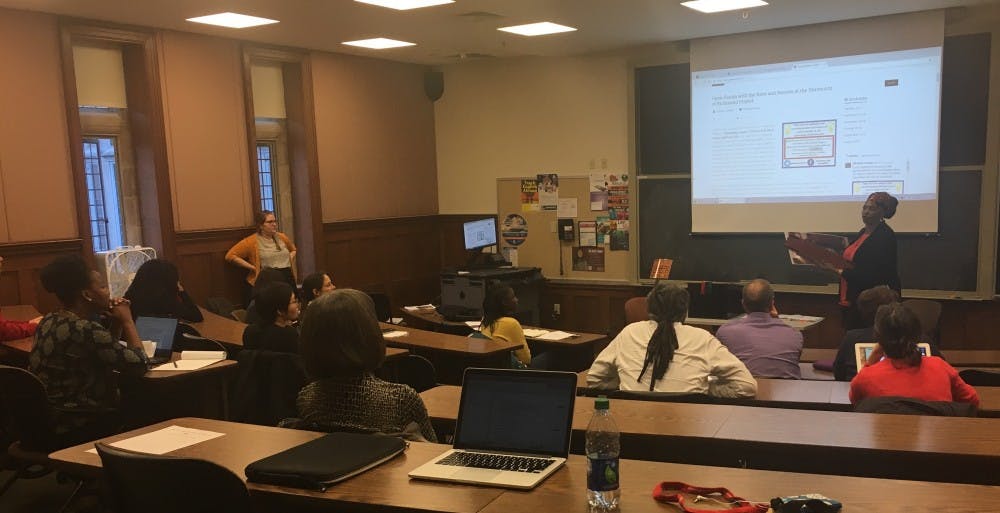University members gathered Wednesday afternoon for a forum to brainstorm how an archiving project to unearth the history of race and racism at the university could be turned into a permanent part of campus.
Irina Rogova, who became an archivist for the Race and Racism Project at the university earlier this past year, had no idea where her discoveries would lead her when she first started.
“This project has become something that is aimed at discussing the kinds of histories we want to hear about our community, and how to get these histories out to our community,” Rogova told forum attendees.
Although the initial goal of the project was to document the history of race and racism at the university, Rogova and Victoria Charles, the post-baccalaureate fellow for the project, soon realized that the information they were unearthing from these boxes could work to uncover a part of the campus’s history that Rogova believes has been forgotten by many.
In order to achieve this goal, the project is partnering with Free Egunfemi, a public historian and the founder of Untold RVA, a community improvement project aimed at documenting missing pieces within the City of Richmond’s racial, ancestral history.
Egunfemi, the forum’s guest speaker, is primarily concerned with bringing her ancestors into the public scope in an interesting way that is also inspirational.
“Saying thank you to those whose shoulders you stand on is critical to my work,” Egunfemi said.
Enjoy what you're reading?
Signup for our newsletter
To do so, Egunfemi uses what is called “tactical urbanism,” or low-cost, temporary changes built into the neighborhood in order to improve them.
Egunfemi has placed what she calls “pod markers” throughout the City of Richmond to document much of its unnoticed history.
Small signs attached to stakes in the ground are color-coded depending on the neighborhood they are located in. Each sign has a number code that any passerby can dial and call. On the other end of the line is a podcast-style recording detailing the piece of history corresponding to the neighborhood.
“I have the opportunity to find out really cool historical things, find someone in the community that it connects to and then ask them to come and record themselves speaking about it,” Egunfemi said.
The big-picture vision for Richmond’s campus is to replicate Egunfemi’s process and create some sort of public visualization that would make connections to the larger story of Richmond.
Charles and Rogova’s archival research has uncovered much about black student life on campus, such as the first black students and employees. However, the people that have been documented do not provide a diverse picture of black student life, as only five people were written about in detail, and they were all male.
“We hope to come up with a platform to discuss these things in a manner that moves away from a list of five black men because clearly five black men does not tell the complete narrative of race and racism on campus,” Charles said.
Elizabeth Baughan, associate professor of classics and archaeology, told forum members that she could see Egunfemi’s idea of the pod markers working on Richmond’s campus, especially if they were to offer a prehistory of race and racism specific to the university.
The exact direction Rogova and her team will take with their discoveries is still unknown but important work will be done this summer with the help of six summer fellows from the university.
One thing remains clear, though: the Race and Racism Project is in a position to bring positive social change to the university.
“I like the idea of being able to use what you have to create something new," Egunfemi said. "This information is not meant to live in a dusty room. The goal is to move things out of the archives and into a place where it will inspire people and celebrate the self-determination story of Richmond."
Contact reporter Jocelyn Grzeszczak at jocelyn.grzeszczak@richmond.edu
Support independent student media
You can make a tax-deductible donation by clicking the button below, which takes you to our secure PayPal account. The page is set up to receive contributions in whatever amount you designate. We look forward to using the money we raise to further our mission of providing honest and accurate information to students, faculty, staff, alumni and others in the general public.
Donate Now



